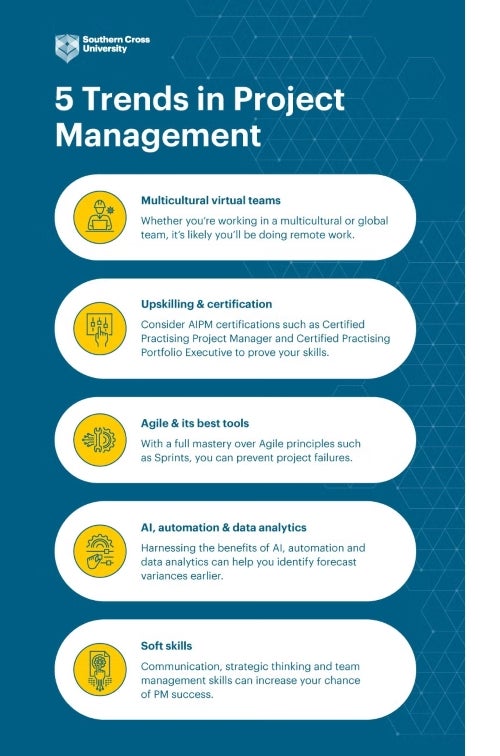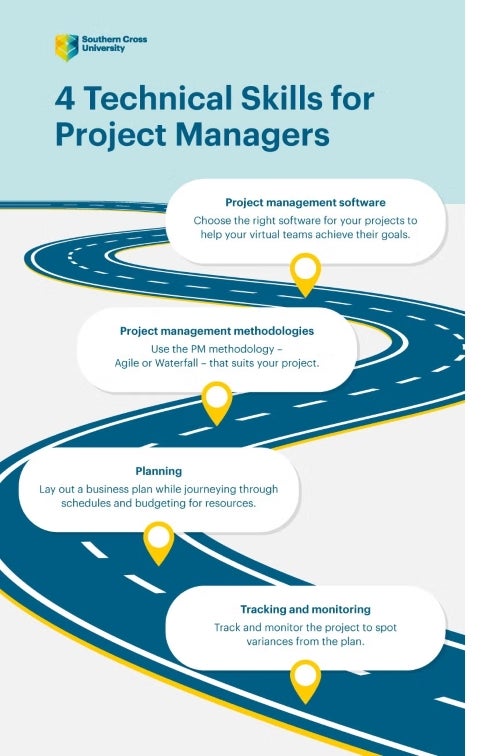Project management is a specialisation that’s constantly evolving and expanding into more and more industries.
In Australia, many trends are driving this growth. From evolving project management software to an increase in data analytics and a demand for strong leadership, innovation is driving the field and making it more comprehensive. Effective project managers (PMs) need to stay at the forefront of these changes to be effective leaders.
Agile project management has been integrated as one of the many options at hand for PMs. The need to upskill with the right certification and to master the ways of Agile are just two emerging trends in project management.
As the demand for project managers continues to surge in Australia, let’s take a detailed look at more recent trends in project management, as well as the project management skills required for 2025.
Recent trends in project management

Whether you have a formal title as a project manager or you’re just working in a project management capacity, you’ve probably realised that project management can be found in many industries.
In legal circles, project management has been refined further to become legal project management (LPM). Legal news repository JD Supra notes that LPM professionals adhere to guiding principles on taking consistent, repeatable approaches to managing matters, as well as promoting transparency during negotiations of project scope and budget.
Project management has marked its significance in the accounting world as well. US-based Boomer Consulting’s visionary and strategist Gary Boomer, for example, advises accountants to include a project manager in their team. Boomer tells Accounting Today that scope creep is common for accountants, but project managers keep it in check along with the resources, budgets and ultimately, project success.
Project management is essential in many industries. You may be working in other capacities, such as in engineering, healthcare or human resources (HR), but your career will also benefit from an upgrade in these project management trends.
Multicultural virtual teams
Project management has undergone a shift to virtual teams with remote teams and work-from-home employees. According to European Employment Services, a multicultural team can achieve better results than a monocultural team, but that success doesn’t happen automatically.
Whether your team includes some of the 29.5 per cent of Australians born overseas (as reported by the Australian Bureau of Statistics earlier this year) or you’re working in a global team that transcends borders, you’re more than likely going to be working with a multicultural team. And, given this emerging trend, your team is probably going to be doing remote work.
What you can do about it
Described as the modern multicultural manager, project management consultant Omar Zein has collected the stories, anecdotes and real-life examples of multicultural teams throughout his project management career.
Seeing multicultural teams more as an opportunity than a threat, Zein believes that when one has developed cultural awareness, they will not only be able to avoid cultural missteps, but also harness the strengths of diversity.
Take a look at Zein’s book Culture and Project Management: Managing Diversity in Multicultural Projects to benefit from his research and experience.
Upskilling, learning and development
Effective project management goes hand in hand with continual professional development. There’s always another certification inviting you to upskill and verify your work experience, which is why upskilling and project management certification will always be on trend.
Learning and development (L&D) is projected to increase and change, according to the Australian Institute of Project Management (AIPM). Employers will support their employees in continuing education as a retention strategy that will help keep project management professionals future-oriented and up-to-date in this rapidly changing field.
Project management leaders can support the professional growth of their employees by encouraging and facilitating their continuing education, such as through certificates and certifications.
Project managers can bolster their skills and knowledge of data analytics and cyber security to ensure they are maximising their digital capabilities and keeping their information secure. They may also seek sustainability education to make sure they are meeting global standards according to PM-Partners.
The AIPM offers a series of certifications under the heading Registered PM. These can take you from your career starting point as a Certified Practising Project Manager, right up to a Certified Practising Portfolio Executive.
What you can do about it
SCU Online’s Master of Project Management course is endorsed by the AIPM and aligned with PMBOK to allow you to strengthen your project management skills and prepare for specialised certifications. This 100% online course has been designed for busy professionals to help them achieve the right qualification within two years part time while they continue their careers.
SCU’s online Graduate Certificate in Project Management course offers an opportunity to upskill and advance your knowledge in project management. This certificate helps you build and develop core competencies in project management, including risk, implementation, planning, evaluation, collaboration and systems analysis.
Increased focus on Agile project management and its best tools
One of the Agile principles is to reflect on how to become more effective, then tune and adjust behaviour accordingly. This is reflected in the ever-evolving practices of Agile.
When you study project management with SCU Online, you’ll start with principles for delivering value to a client or organisation, and then learn how to tailor the approach to suit the context and project characteristics.
What you can do about it
Introduction to Agile Project Management is one of the core units of SCU Online’s Master of Project Management.
Wherever your project management journey with Agile began, this postgraduate course will set you on the right path of learning starting from the origins of the Agile Manifesto. With a full mastery over Agile, you can stop the trend of project failures in your workplace.
One of the key elements of Agile project management is sprints – a breakdown of large projects that are run over a shorter time frame to produce regular deliverables for the customer. You’ll also gain the latest insights in using Agile in hybridised project management situations.
Expansion of artificial intelligence, automation and data analytics
Proficiency in artificial intelligence (AI), automation and data analytics are important project management skills.
AI, automation and data analytics are transforming project management in Australia, enabling businesses to operate more efficiently and with greater precision. These technologies streamline processes, improve decision-making and optimise resource allocation, making them essential for modern project management. Here’s how.
Artificial intelligence
AI plays a pivotal role by automating routine tasks, such as scheduling and risk assessment, which allows project managers to focus on higher-level strategic activities.
Predictive and generative AI tools can create new content, as well as predict trends, identify potential risks and suggest solutions by analysing historical data and trends. This can help managers streamline processes and make more informed decisions, enhancing project outcomes by reducing human error and providing data-backed insights.
Automation
Automation boosts efficiency by eliminating manual, repetitive tasks like progress tracking, task allocation and status reporting. With automated workflows, projects can move forward seamlessly, reducing bottlenecks and ensuring timely delivery.
This is particularly valuable in sectors like construction, information technology (IT) and manufacturing, where project timelines and budgets are often tight.
Data analytics
Data analytics further supports project managers by providing valuable insights into performance metrics, resource utilisation and cost-effectiveness. Through real-time data monitoring, managers can identify potential issues early, adjust strategies and optimise resources.
Data-driven decision-making leads to better forecasting, risk management and cost control, improving overall project success.
In Australia, where industries such as mining, construction and tech are highly competitive, the integration of AI, automation and data analytics in project management gives companies a significant edge.
What you can do about it
In addition to doing research into digital transformation, keep an eye on the AIPM blog and webinars for industry updates. Recent blog articles have focused on project management in the digital age and the future of AI in Australia.
Contrary to popular beliefs, digital transformation in project management is not going to replace project managers with robots, even though they have capabilities that exceed those of humans.
In order to embrace the new digital world, ensure that you use as many digital project management tools as possible. This will help you gain the required skills to master them.
Greater importance of soft skills
You may be surprised to hear that, according to the AIPM last year, all of Australia’s top project managers have one thing in common – highly developed project management soft skills.
Recently, JLL Project Director Kelly Poniris won AIPM’s national Future Project Leader (Under 35 Years) award. Among her other skills, Poniris is a strong communicator with stakeholders, from clients and consultants to regulatory authorities and all levels of government.
Bridge42 WA State Manager Nick de Vries was recognised as a National Senior Project Professional. He was not only awarded for his high-level strategic thinking skills when managing Perth’s most prominent landmark projects (such as Perth City Link, Forrest Chase Redevelopment and Belmont Park Redevelopment) – he was also commended for his strong abilities in leading large teams of consultants and contractors.
What you can do about it
Observe your leadership, management, communication and ethical decision-making skills. There’s an opportunity for you to do this with expert guidance should you choose to undertake SCU Online’s project management graduate certificate, graduate diploma or master’s degree.
This is a rare opportunity to try on different management styles for size. You’ll be guided through self-reflection to assess and refine your abilities in positive, transformational and authentic leadership.
Technical skills required in project management
According to PwC Australia, not having a clear goal or vision is a common cause of project failure. With the right technical skills, you can ensure that goals are set and met.
These are the key technical project management skills required for you to succeed.

Project management software
University students are using cloud-based project management software for collaborating on assignments, and even project managing their entire degree. So, can such software be used by project managers to their full potential?
Project management software does more than show you a Gantt chart and align your work with project management methodologies – it brings your project communications, materials and team members to one place.
When you choose the right software to use for your projects, you will help your virtual teams achieve their goals.
Project management methodologies
There is a detailed set of principles you need to abide by to achieve your goals efficiently and effectively, even in the most complex of projects. Agile and Waterfall methodologies are two of the most popular workflow methodologies, but one is not a replacement for the other – it depends on the project at hand.
Constructing a building requires a linear process that can’t be adjusted at completion. This project can benefit from perfect Waterfall project management.
Developing software, meanwhile, uses a less linear approach as the finished product can be repeatedly adjusted, making it an ideal Agile project.
With a deep understanding of Agile, you can avoid ‘faux-gile’ mistakes and be ready to evolve as workplaces continue to become more remote and hybridised.
Planning
Project managers must be able to lay out a comprehensive business plan while journeying through work schedules and budgeting for finite resources.
While these tasks might sound like they require fundamental technical skills, you may find yourself in a project management role without formal training in those areas.
Upskilling and gaining certifications can be done online on a part-time basis, allowing you to apply your new skills in the workplace immediately.
Tracking and monitoring
Ideally, risk management is taken care of before a project gets underway, but tracking and monitoring can highlight potential risks early on and provide project managers with more time to respond effectively.
Skills in tracking and monitoring are essential in spotting variances from the plan so you can realign your trajectory towards your goal.
By embracing AI, automation and data analytics, you’ll upgrade your ability to generate accurate forecasts and predict an unfavourable situation earlier.
The future of project management
A study by Business Talent Group reveals that high-level professionals, including management consultants and executives, have identified project management skills as some of the most in-demand skills. The successful completion of projects will be one way in which businesses deliver value to their stakeholders.
If you’ve got a PM’s eye for risk management, you might want to start working on your advanced project management skills to reach your career goals.
Want to start your professional development journey with SCU Online? Speak with our Student Enrolment Advisors about our Master of Project Management course and how it can enhance your career on 1300 863 819.






